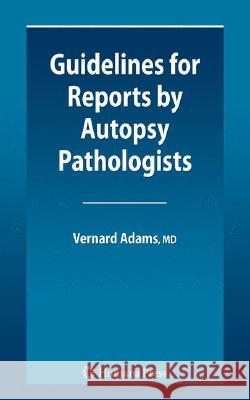Guidelines for Reports by Autopsy Pathologists » książka
Guidelines for Reports by Autopsy Pathologists
ISBN-13: 9781603274722 / Angielski / Twarda / 2008 / 148 str.
Guidelines for Reports by Autopsy Pathologists
ISBN-13: 9781603274722 / Angielski / Twarda / 2008 / 148 str.
(netto: 474,01 VAT: 5%)
Najniższa cena z 30 dni: 497,71 zł
ok. 20 dni roboczych.
Darmowa dostawa!
Guidelines for Reports by Autopsy Pathologists is intended to help the autopsy pathologist produce reports that communicate well. Having evolved from a coll- tion of faculty critiques of the autopsy reports, summary and opinion reports, scene reports, and death certi?cates produced by residents in anatomic pathology and f- lows in forensic pathology, the book emphasizes topics that have been troublesome for trainees. For clinicians, the medical record describes their work product. For autopsy pathologists, the written report is the work product and demands an acco- ingly higher standard of composition. Most reports produced by pathologists can be divided into objective and subjective elements, or, in other words, ?ndings and opinions. The pathologist must have a clear understanding of the linkage between the two. When composing a report, the autopsy pathologist should serve the goal of c- municating to the parties who will read the report, namely, the case pathologist him- or herself (at a later date), attorneys, the family of the decedent, and other physicians. I believe that careless and imprecise thinking leads to sloppy language, and that sloppy language leads to careless and imprecise thinking. In my experience, pathologists who learn how to clearly express and organize their ?ndings and op- ions in a written format make more detailed and focused observations at the autopsy table.











